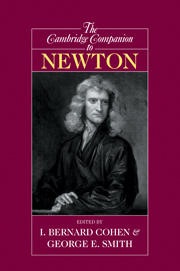Book contents
- Frontmatter
- Introduction
- 1 Newton's philosophical analysis of space and time
- 2 Newton's concepts of force and mass, with notes on the Laws of Motion
- 3 Curvature in Newton's dynamics
- 4 The methodology of the Principia
- 5 Newton's argument for universal gravitation
- 6 Newton and celestial mechanics
- 7 Newton's optics and atomism
- 8 Newton's metaphysics
- 9 Analysis and synthesis in Newton's mathematical work
- 10 Newton, active powers, and the mechanical philosophy
- 11 The background to Newton's chymistry
- 12 Newton's alchemy
- 13 Newton on prophecy and the Apocalypse
- 14 Newton and eighteenth-century Christianity
- 15 Newton versus Leibniz: from geometry to metaphysics
- 16 Newton and the Leibniz-Clarke correspondence
- Bibliography
- Index
7 - Newton's optics and atomism
Published online by Cambridge University Press: 28 May 2006
- Frontmatter
- Introduction
- 1 Newton's philosophical analysis of space and time
- 2 Newton's concepts of force and mass, with notes on the Laws of Motion
- 3 Curvature in Newton's dynamics
- 4 The methodology of the Principia
- 5 Newton's argument for universal gravitation
- 6 Newton and celestial mechanics
- 7 Newton's optics and atomism
- 8 Newton's metaphysics
- 9 Analysis and synthesis in Newton's mathematical work
- 10 Newton, active powers, and the mechanical philosophy
- 11 The background to Newton's chymistry
- 12 Newton's alchemy
- 13 Newton on prophecy and the Apocalypse
- 14 Newton and eighteenth-century Christianity
- 15 Newton versus Leibniz: from geometry to metaphysics
- 16 Newton and the Leibniz-Clarke correspondence
- Bibliography
- Index
Summary
After his first optical publications in 1672 Newton was identified by his contemporaries and later generations as a supporter of the corpuscular or emission theory of light, in which light is assumed to consist of corpuscles, or atoms, emitted from a luminous source such as the Sun. While it is true that Newton believed in a corpuscular theory, utilized it in developing many of his optical experiments and theories, and argued vigorously against the wave theory of light, he never believed that it was a demonstrated scientific truth and considered it to be only a probable hypothesis. This distinction explains why, for example, he never set forth a synthetic account of the emission theory and eschewed it in his public accounts of his scientific theories. In order to understand Newton's advocacy and use of atomism in his optics it is necessary to understand his views on hypotheses and certainty in science.
HYPOTHESES IN NEWTON’S SCIENCE
From the beginning of his scientific career Newton was concerned with establishing a new, more certain science to replace contemporary science, which he felt was rife with “conjectures and probabilities.” He believed that he could establish a more certain science both by developing mathematical theories and by basing his theories on experimentally discovered properties. To establish a more certain science, Newton insisted that one must “not mingle conjectures with certainties.”
- Type
- Chapter
- Information
- The Cambridge Companion to Newton , pp. 227 - 255Publisher: Cambridge University PressPrint publication year: 2002
- 10
- Cited by

